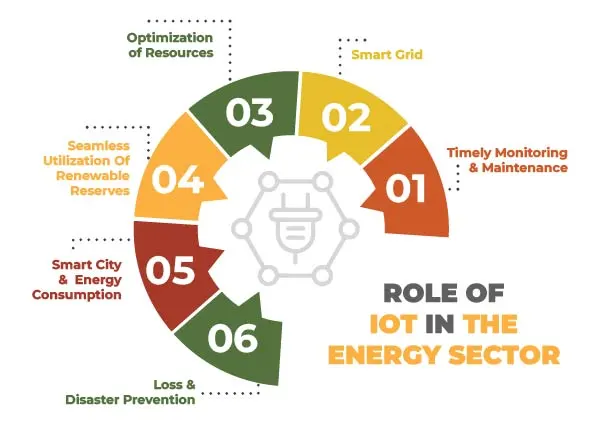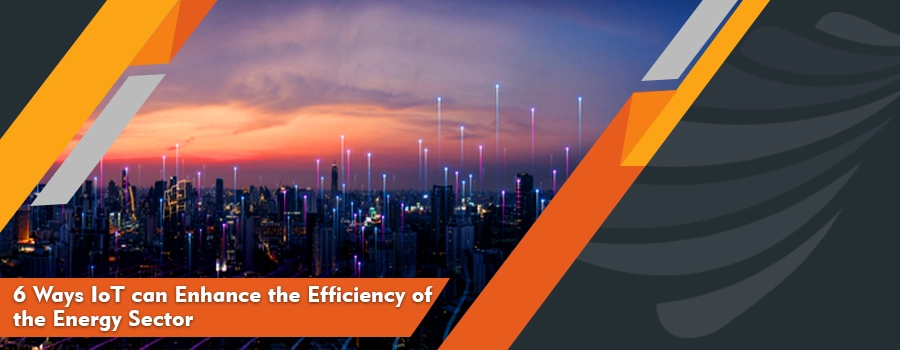With the growing population and urbanization, the world’s requirement for energy is on a constant rise. Indeed, there is a significant burden on the energy sector to produce the required power for utilization. According to the projection of the US Energy Information Administration, global energy consumption may increase by 50% by 2050. This shows the necessity of thinking outside the box to fulfill the increasing requirement of energy production and consumption.
Moreover, there are certain challenges or problems that the energy sector has constantly been facing with time. For instance, issues like lack of proper maintenance, energy fluctuations, or utilization of non-renewable resources for energy production are among the crucial issues the sector may face during power generation. This kind of energy generation may adversely affect the environment around us, causing different types of pollution while adding fuel to climate change.
Role of IoT in the Energy Sector
Given the importance of the energy industry, it is pertinent for countries to invest in IoT solutions and technology to increase the sector’s efficiency and productivity. Almost every industry is now reaping the benefits of IoT by making their operations automated and error-free. It has the tendency to improve different aspects of any industry. Likewise, with IoT in energy management, city administration can mitigate various issues while ensuring an uninterrupted energy supply to its residents.

Nonetheless, below are several benefits of IoT in energy management that could be vital in enhancing its productivity:
– Timely Monitoring and Maintenance
The essential features of IoT solutions and technology involve data exchange, storage, and analysis. Data which is an integral part or aspect is collected by smart sensors present in IoT devices. This is why the energy industry can utilize IoT for smart energy management by keeping track of its system metrics. A manual way of checking and locating problems is a long and laborious process that may even lead to the wrong diagnosis of the problem. In contrast, with IoT in the energy industry, managers can ensure timely monitoring of the system’s condition, performance, and energy production. Plus, any type of energy production mechanism can also utilize IoT-enabled sensors for convenient maintenance. Smart sensors can alert managers about maintenance and even schedule proper timing for it after analyzing the data of energy consumption patterns. This will prevent unusual energy fluctuations and cut-offs, as the system will be able to provide an uninterrupted energy supply.
– Smart Grid
Another benefit of IoT that the energy sector can utilize is a smart grid system for energy distribution and flow. Previously, the grid system used to be inefficient as there was irregularity between energy generation and demand. This would usually cause a tremendous load on the grid system, causing energy shortages and fluctuations in the past. However, with IoT in energy management, operations from energy production to distribution around the city have become swift and hassle-free. Plus, with analytics of collected data, managers can ensure smart energy management via a smart grid system. The smart grid system can greatly help control energy flow while curtailing energy consumption simultaneously. This will automatically reduce the energy load with respect to its production. Moreover, the smart grid system will be beneficial for hybrid or electric cars. This will allow the city to generate cost-effective energy that suits both the economy and the environment exceptionally.
– Optimization of Resources
IoT in energy management ensures automation in energy production, execution, and distribution citywide. It enables energy plant managers to make balanced decisions that can enhance the quality of energy production and consumption while reducing waste. IoT technology can help extensively monitor energy plant operations in the form of data. Managers can quickly access it on the cloud and perform analytics to convert it into relevant information. Then this information can be used to meet the demand and supply while optimizing the generation and planning of energy production.
– Seamless Utilization Of Renewable Reserves
The traditional energy production mechanisms primarily consist of non-renewable resources like oil and coal. Using such methods of energy production in today’s world is both obsolete and costly, which may further have harmful effects on our environment. Burning coal and oil for energy pollute our environment and destroy the ozone layer while causing multiple diseases among humanity. This is why the world is moving to renewable resources for energy production. Incorporating IoT solutions for such processes can be a blessing in disguise, as it can facilitate a swift transition from non-renewable to renewable resources. One of the applications of IoT technology, like the smart grid system, can be used for technical support in installing solar panels. Plus, IoT-driven intelligent monitoring sensors, data and utilities can help the city administration or energy plant managers to maximize and extract the full potential of renewable resources. It can aid smart energy management in properly maintaining the equipment & machinery while increasing its production efficiency.
– Smart City and Energy Consumption
It is apt to say that the world is transforming owing to digital and technological advancement. Simple cities are inevitably going to transform into smart ones. As per the concept, a Smart city refers to an urban place that uses advanced technology like IoT to raise the standard of living and modernize the lifestyle, e.g., smart healthcare, transportation, etc. Likewise, smart energy management is another crucial component of the smart city. By incorporating IoT technology, the city can enhance the infrastructure of the energy sector by developing smart energy-related solutions. For instance, smart street lighting systems can illuminate streets or smart traffic signals to regulate transportation citywide. IoT-energy smart sensors present in these solutions can help gather different data, providing crucial insight into traffic patterns. This can be utilized to reduce traffic congestion and optimize energy consumption throughout the city. In this way benefits of IoT can add superior value to the smart city by increasing the efficiency of the energy industry.
– Loss and Disaster Prevention
IoT solutions can be beneficial for preventing accidents and disasters in the energy sector. Indeed, working close to energy plants can be a risky task. Smart sensors and IoT innovation can raise the operational safety of onsite workers and managers while reducing the possibility of accidents. IoT solutions pave the way for a predictive approach to remotely handle and improve energy generation. For instance, automated drones can be utilized to find gas leaks which could reduce the need for human investigators and secure precious lives. Furthermore, in case of blackouts and outages, a smart analytics system can aid in locating the problem and provide an effective plan and strategy for repair & correction. Also, this system can provide insight into energy consumption and spikes so that managers can take necessary measures to neutralize the overload and satisfy the demands efficiently.
In a nutshell
IoT in the energy sector can ensure smart energy management by optimizing production via data analytics and innovative machinery, along with monitoring the supply and consumption of energy in big cities. It can enhance the uninterrupted distribution of energy citywide while reducing the carbon footprint in energy generation. Indeed, smart energy extracted from renewable resources can be counted as a plus point for the smart city and its people.




